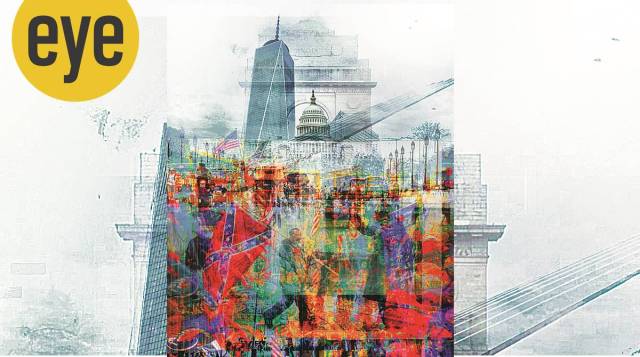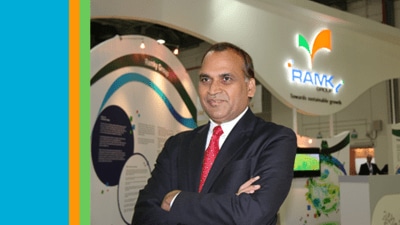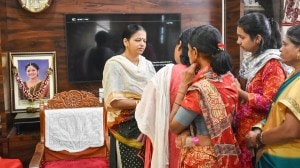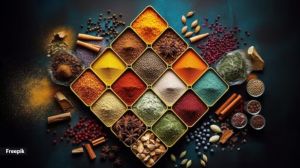- India
- International
The USA’s moment of reckoning speaks to all of us
What India - and the rest of the world - can learn from how the world's oldest democracy tackled its most urgent crisis
 Illustration : Suvir Saran
Illustration : Suvir SaranScience tells us about the dopamine rush we experience when we process information that supports our beliefs, no matter how fake that information might be. Most of us tire easily and choose to remain in the comforting confines of sameness, where our misguided thoughts go unchecked and we feel good about ourselves and the world as we choose to see it.
But reason demands more from us. Reason challenges us to evolve and grow.
Modern School, Vasant Vihar in New Delhi, was originally conceived as an alternative to the missionary schools operating through the prism of Christianity and the colonisers’’ sensibilities about education and childhood development. My father was educated at Modern while my mother is a product of Irish Catholic convent education. I consider it my good luck to have benefited from a mix of their two educational sensibilities. From age six to 18, I was made aware of India’s challenges, its cultural wealth and societal issues, its rich diversity and fragile secular dreams. My parents came of age with a colonial background from which they gleaned light and growth. I came of age in an India gluing itself into a mosaic, where plurality was valued and our many Indian faces and forms connected us to our common humanity. The challenge of this immense task, the communal riots and vexing polarisations fomented by recklessly self-serving and vote-hungry politicians, was ours to observe, study and discuss with our teachers and parents. I grew up watching India go from strength to strength while occasionally being brought to its knees through human folly.
The autumn of 1993 brought me to New York City to study graphic design and art history. Family and friends welcomed me with love and gave me nurturing support. I found myself happily settled in NYC within weeks and living the life of a Manhattanite. That life eroded the divisiveness I might have felt with those that seemed different from me. That was how all of us who made a home in NYC lived.
Eight years into what might have been considered utopia by most, I was in the shower when I heard sirens and chaos in the streets. Hair still wet and clothes barely buttoned, I was on the rooftop within minutes to see what was happening and why there was so much smoke close to my home in Greenwich Village. My father called about a terrorist attack at the same moment the second plane hit the towers. That image is etched in my memory. Also engraved in my psyche is the scent of burning flesh and building material. But the most lasting imprint was left by the callous behaviour shown by those from outside the city to some of us who lived there.

After 9/11 it became clear that America is not one nation but two nations within the construct of one. A week and a half after the attack I was at the Union Square Farmers Market, only a few blocks from my home, buying vegetables and comestibles for a meal with friends, so that we could come together and share our grief and find hope for tomorrow. Instead, I came home bruised after a tourist broke a bottle and hurled it at me, calling me a “f***ing Arab terrorist” who ought to leave the US and go home. Other New Yorkers saved me, and I arrived home a tad shaken. Scratched and sore, I cooked dinner, served our friends, and received caring support from them.
A few years later, my first cookbook, which would go on to become one of the most popular Indian cookbooks published in the US, debuted as the nation was healing. My restaurant Devi, which got the first Michelin star for an Indian restaurant in North America, opened at the same time. This recognition brought me endless opportunities, afforded me by incredible Americans. I travelled across the US speaking and teaching, feeding and sharing, and appearing on TV shows. My likeness and my recipes, my bio and my story, were celebrated in newspapers and magazines big and small. I was All-American; I felt as if I belonged. I saw the world as being one village; I saw humanity in the other.
But lurking in the feting, in the crowds lining up to get their cookbooks signed, in the lauded airport arrivals, was the America I’d encountered at the farmers’ market in Union Square — a nation divided, unable to grapple with a society where there could be equality among people who look very different from one another, who speak differently, who come from different parts of the world. And, so, I would be strip-searched. I would be detained for hours in airport back rooms until the authorities were convinced that this brown man wasn’t a terrorist. I would be called names, I would be humiliated. People would marvel that I spoke English, would be shocked that I ate with a knife and fork.
January 6, 2021, was a reminder that America is a tale of these two countries. Two very different realities, bitterly polarised and unable to accept the other as equal and to hold honest and meaningful dialogue.
If America wants the world to see it as exceptional, it needs to become that. On January 6, the world saw America as far from exceptional. It was Iraq, it was Afghanistan, it was Syria. Now the world watches to see if these two Americas can come together, with the same reality for all its people. The Joe Biden-Kamala Harris administration will need to heal this festering wound before anything else.
But what happened at the Capitol in Washington DC will not be contained by American borders. How America reacts to the insurrection is how democracies around the world may react to the same challenges tomorrow. Other nations still believe in America, in the image it projects and what it wants to be. Fledgling countries are watching “the shining light on the hill”.
As we prepare for our own Republic Day in India on January 26, the lessons of history are staring us in the face. Through her long history Mother India has survived loot and plunder, hate and bigotry, communalism and authoritarianism and has always ended up living proud and bright for her embrace of the plural over the singular.
But the oldest and the largest democracies of the world are dancing to the seductive tune of viral conspiracy theories and cunningly-executed campaigns of deception. These pose a vexing problem to geopolitics, with dangerous outcomes for the world. Myopia has led to self-destructive behaviour in the US, and a similar jingoism and sectarianism is found across the world.
America, as we once knew her, has fallen. She might still have a chance to survive, but poorer nations, with many more challenges, have doom looming large over them, unless they nip dangerous behaviours in the bud.
Democracies newer and developing have a moment of reckoning and awakening, a call to fill the void of reason and decency that has been at least temporarily left by the US. This dreamer hopes that nations steeped in civilisational history, generational empathy and maternal instincts can stop fashioning themselves after the machismo and fascism that we have seen being championed in the West. May both the United States of America under Biden and Harris and the old and sage Republic of India find comfort in their shared ideals of belief, faith and respect in our shared humanity, and in our disparate beliefs and ethnicities. May we use this momentary horror to guide us back to our hallowed paths of national growth and international camaraderie, e pluribus unum (out of many, one) being the uniting link across all democracies wanting to be civil societies.
Apr 26: Latest News
- 01
- 02
- 03
- 04
- 05








































